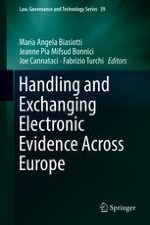2018 | OriginalPaper | Buchkapitel
2. Present and Future of the Exchange of Electronic Evidence in Europe
verfasst von : Maria Angela Biasiotti
Erschienen in: Handling and Exchanging Electronic Evidence Across Europe
Aktivieren Sie unsere intelligente Suche, um passende Fachinhalte oder Patente zu finden.
Wählen Sie Textabschnitte aus um mit Künstlicher Intelligenz passenden Patente zu finden. powered by
Markieren Sie Textabschnitte, um KI-gestützt weitere passende Inhalte zu finden. powered by
